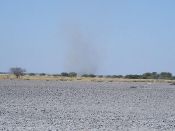| Study site location & description |
 |
|
The Ribeira Seca study site is located in central Santiago island, Cape Verde.
Most of the Cape Verde islands register less than 100 mm of rainfall per year, and even the southernmost islands rarely exceed 250 mm/yr. Life is only possible in Cape Verde due the amenity of the Atlantic Ocean and the efforts of the local inhabitants on soil and water conservation.
Santiago Island is the biggest and most densely populated island in the Cape Verde Archipelago, and is packed with soil and conservation structures which help to manage very fragile ecosystems. Despite these efforts, the risk of soil erosion and degradation is very high, since all the soils available are used for agriculture, regardless of their slope angle, aspect or quality. High erosion rates occur during heavy rainfall events, and are considered the most critical environmental and agricultural problem in Cape Verde. The high erosion rates are closely related to the agricultural practices used. Cape Verde has been developing an overwhelming effort to reduce erosion processes, by increasing the afforested area and specific soil and water conservation measures. These include measures for sloping areas and for flat areas, namely the use of mechanic structures such as terraces, dikes, as well as biological structures.
Cape Verde represents therefore one of the places on earth where environmental conditions pose enormous challenges to human activities. The fact that almost half a million persons live in ten small islands under such conditions indicates the importance and relevance of soil and water conservation techniques in combating desertification.
|
|||||||||||||||
Study sites

Acknowledgement
The DESIRE project was
|
DESIRE brought together the expertise of
26 international research institutes
and non-governmental organisations.
This website does not necessarily
represent the opinion of the
European Commission. The European
Commission is not responsible for
any use that might be made of the
information contained herein. 







